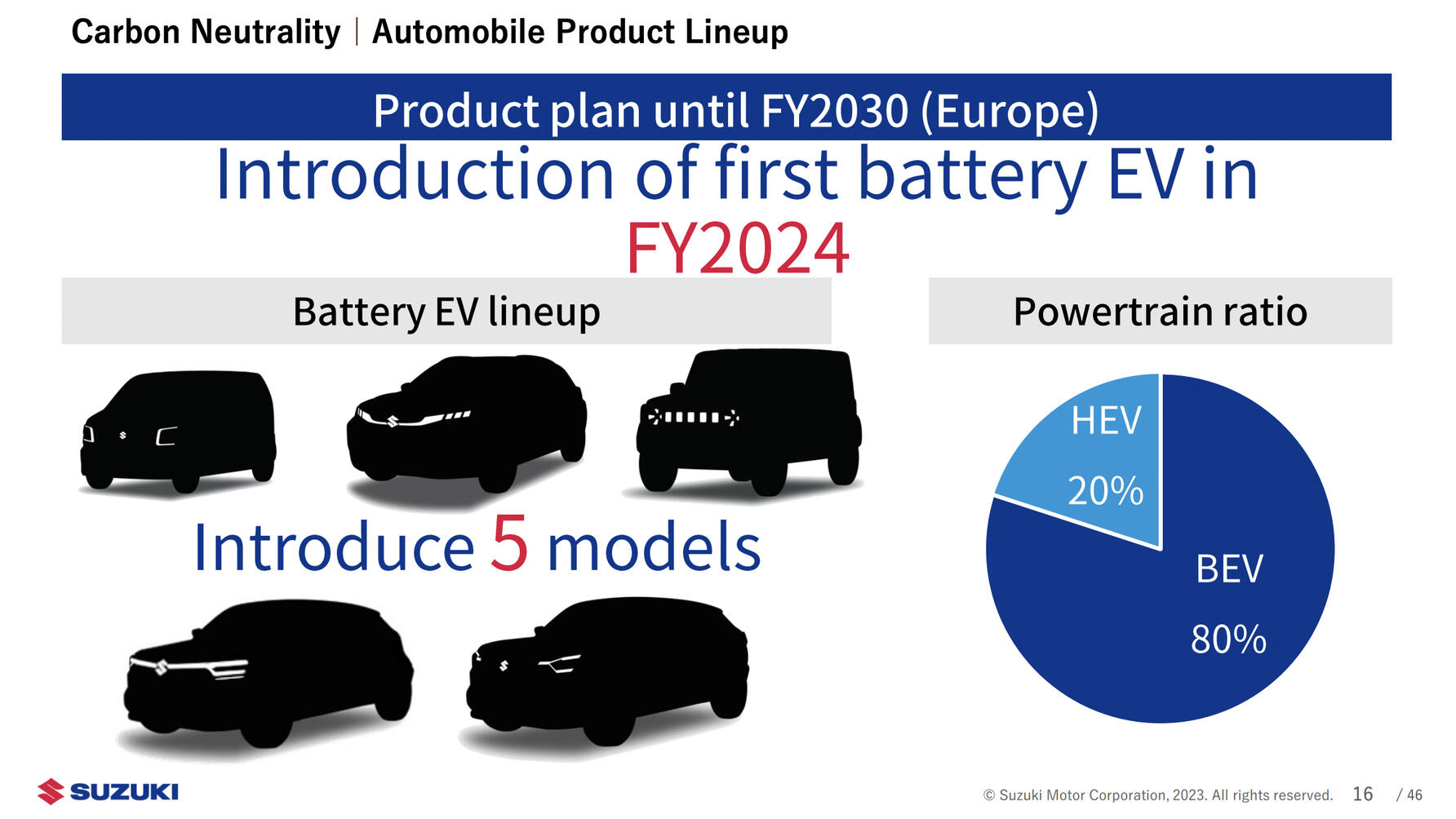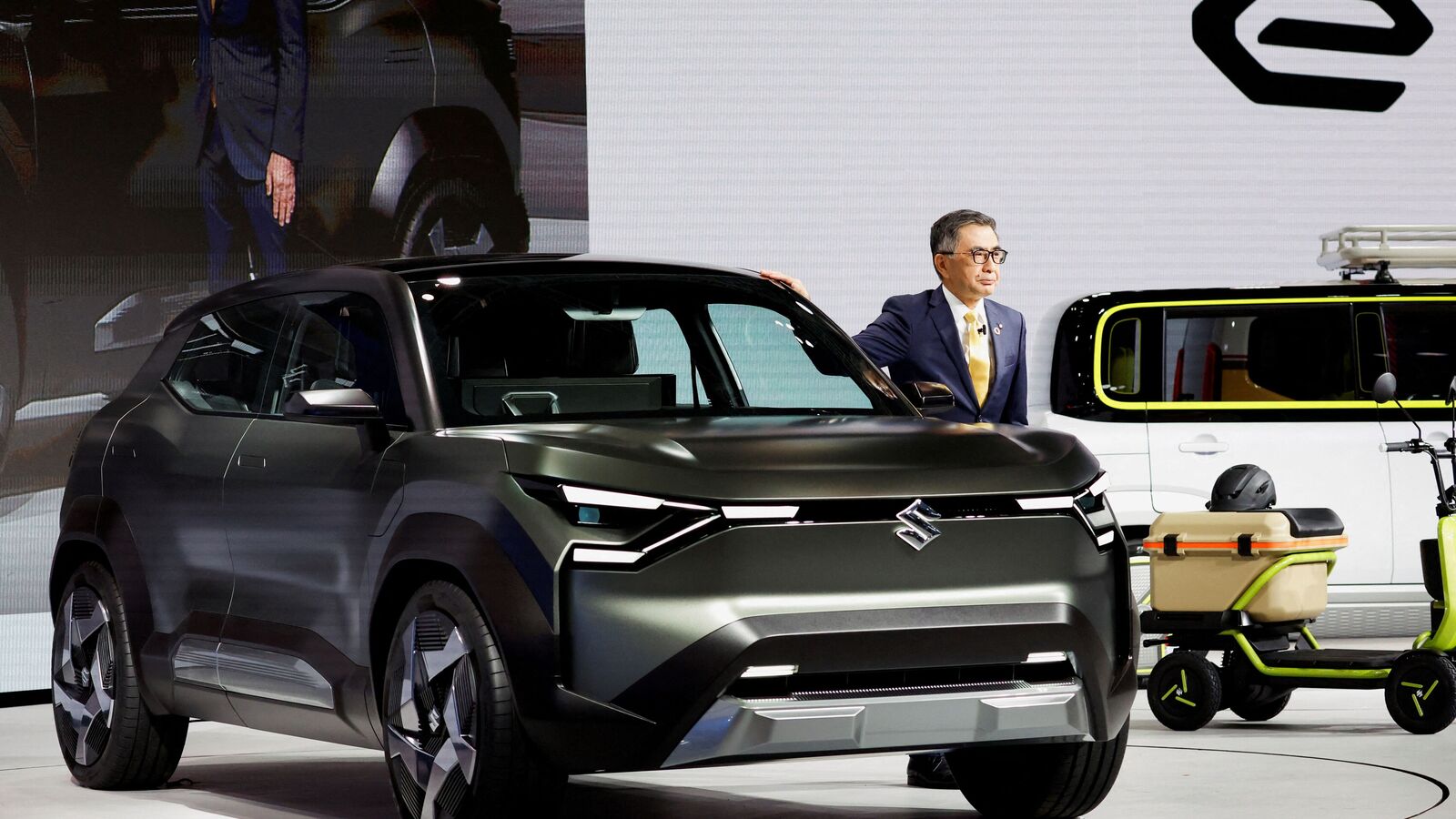Toshihiro said India is and will remain a key business area for the company to achieve its growth strategy for fiscal year 2030. Interestingly, in fiscal year 2023, the company achieved revenue of 5.4 trillion yen with sales of 3.2 million cars and 1.9 million motorcycles. Globally, Suzuki is targeting sales of 7 trillion yen in fiscal year 2030, and achieving sustainable growth.
Also read: Maruti E Vitara equipped with off-road technology unveiled for the first time
The focus here is on sustainable development. For FY2029-30, Suzuki has said this will contribute to the achievement of a carbon neutral society and the economic growth of our core business areas, Japan, India and Europe along with emerging countries such as India, ASEAN and Africa. main.
The focus will be on creating solutions that are unique to Suzuki, developing customer-centric products and services and growing with the operating countries and regions.
India's role changing dynamics for Suzuki
One of Suzuki Corporation's key goals for fiscal year 2030 is to achieve significant progress toward carbon neutrality. The company aims to reach carbon neutrality by 2050 in Japan and Europe and by 2070 in India in line with the target dates set by the respective governments.
Additionally, the company also plans to grow in other regions such as Africa, Latin America, and Southeast Asia. Central to this goal is Suzuki's electric vehicle (EV) strategy, which includes plans to introduce six EVs in Japan and India and five in Europe by fiscal 2030. This transformation begins with the Suzuki E Vitara, the brand's first electric vehicle.
Suzuki had earlier announced a lineup of five EVs, which included the Maruti Suzuki E Vitara, WagonR, FrontX and two other models, starting with the E Vitara. Notably, production of the Suzuki e Vitara will begin at Suzuki Motor Gujarat (SMG) by spring 2025, with plans for export to global markets.
To support its BEV production, Suzuki has committed to invest Rs 3,200 crore to add fourth production line at SMG plant. With this expansion, the annual production capacity of the plant will increase from the current 7,50,000 units to 10 lakh units by FY 2026.
Additionally, Suzuki plans An investment of Rs 3,500 crore to set up a second facility at SMG, which will add another one million units annually by FY2029. This expansion will ultimately increase SMG's total production capacity to two million units annually, supporting Suzuki's ambitious global growth and sustainability goals.
Suzuki's technology strategy for carbon neutrality
In addition to increasing production, Suzuki Corporation has outlined a comprehensive technology strategy for the next decade aimed at achieving its carbon neutrality goals. This strategy focuses on reducing energy consumption through three main concepts: genba, genbutsu, genjitsu (visit the site, make direct observations and determine the facts), sho-sho-kei-tan-bi (small, less, light, small), beauty) and yaramika (to challenge).
Toshihiro highlighted that the company's electric vehicle (EV) strategy will be guided by the principles of Sho-Sho-Kei-Tan-Bi, which emphasizes the production of compact, efficient and resource-conscious vehicles. This philosophy drives the development of EVs with streamlined, highly efficient motors and lightweight batteries, ultimately maximizing energy efficiency while minimizing environmental impact.

Furthermore, Suzuki's commitment to energy efficiency extends to the entire vehicle life cycle. At the heart of this approach is the concept ofkeiOr density. According to Toshihiro, Suzuki cars are about 200 kg lighter than typical European, Indian or Japanese cars.
Also read: Suzuki unveils sustainability roadmap: Focus on lighter cars, EVs. check details
This reduction in weight translates into a 6 percent reduction in energy required for driving, 20 percent less energy for manufacturing and less resource use overall, significantly cutting CO2 emissions and contributing to a more sustainable future. This is in line with Suzuki's ambition to do so.
Multidimensional approach key to sustainability
While EVs are a central focus, Suzuki's sustainability strategy covers a wide range of initiatives. The company is actively developing vehicles designed for high-efficiency internal combustion engines, advanced driver assistance systems and streamlined recycling and disassembly, with the aim of reducing its overall environmental footprint.
Suzuki Corporation understands that a “one size fits all” approach to electric vehicles (EVs) is not practical for global markets. According to Toshihiro, the company plans to diversify its investments not only into battery EVs but also hybrids and internal combustion engines. ICE) which operate on alternative fuels like CNG, biofuel and ethanol. This multi-pronged approach enables Suzuki to offer tailored solutions that maximize performance and energy efficiency in different markets.
Also See: Maruti unveils eVX EV concept at Auto Expo 2023
Suzuki's commitment to regional carbon neutrality goals aligns with its mission to expand customer choice and provide products and services that meet specific regional needs. By addressing environmental impact across various technologies, Suzuki aims to support sustainable mobility and meet the unique demands of each market.
Brand perspective is changing
Toshihiro sees Suzuki's future as a “lifestyle infrastructure company”, playing an integral role in revitalizing economies by addressing daily mobility needs through initiatives such as infrastructure development and next-generation mobility solutions.
The company is dedicated to providing high-value products and services that make it essential for both people and society. According to Toshihiro, this mission includes a strong commitment to the achievement of carbon neutrality and a sustainable future, positioning Suzuki as a major contributor to social and environmental progress.
Get information about upcoming cars in India, electric vehicles, upcoming bikes in India and cutting-edge technology that is changing the automotive landscape.
First publication date: 05 November 2024, 10:25 AM IST

